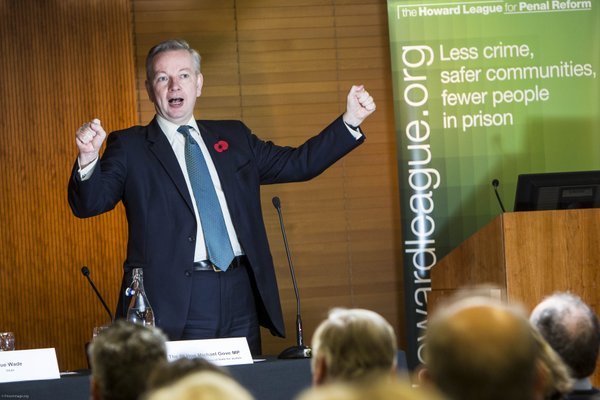 Michael Gove yesterday confirmed that the consultation on a British Bill of Rights will again be delayed. The consultation will now take place in the New Year.
Michael Gove yesterday confirmed that the consultation on a British Bill of Rights will again be delayed. The consultation will now take place in the New Year.
The Lord Chancellor indicated, while giving evidence to the House of Lords’ Constitution Committee, that the delay was caused by ‘complex’ constitutional changes which require ‘serious thought’. According to Gove, David Cameron requested that the legislation look at establishing a ‘constitutional long-stop’ to have oversight over human rights protection and he noted that he would need time to consider whether the UK Supreme Court should act as that body.
Meanwhile, Gove today announced that he would be scraping the widely criticised criminal court charge as of December 24. Whilst the intention behind the policy was ‘honourable’, he said that ‘in reality that intent has fallen short‘.
Earlier this year the Government attracted criticism for its attitude to human rights when the European Court of Human Rights held – for the fourth time – that the UK’s blanket ban on giving convicted prisoners the vote was contrary to the ECHR. Most European countries and in 18 countries of the EU there is no electoral ban for prisoners.
In yesterday’s evidence session, Gove denied the accusation that the government had damaged the UK’s reputation by ignoring the European Court of Human Rights over the issue of prisoner votes. He stated: ‘It is not letting the side down if parliament decides it doesn’t wish to implement it.’
He told peers that he believed that any future bill of rights would strengthen protection for individuals and minorities. Gove said:
‘The good name of human rights has been tarnished – we can debate why and who is to blame if blame should be allocated.’
Gove insisted the eventual British bill of rights, intended to replace the Human Rights Act, will ‘strengthen’ the rights of minority groups while removing protections for ‘unmeritorious’ people. ‘Human rights have come to be seen as providing protection for people who are unmeritorious rather than safeguarding essential liberties which go to make the birthright of any individual of these islands.’
By contrast, the campaigning group Act for the Act recently highlighted the value of the Human Rights Act in the case of Martina Brincat-Baines, whose worries about their 17-year-old daughter’s mental health were repeatedly ignored and subsequently used article 8 to ensure parents’ voices have to be heard. She said:
‘I thought the Human Rights Act was for other people. I didn’t think it was anything to do with me. But when my daughter Kesia died, I suddenly needed the Human Rights Act. I was able to use it to get the law changed to make sure other vulnerable young people are better protected in future.’
On the international stage, some are worried that the UK’s refusal to implement ECHR judgments will encourage other Council of Europe nations, such as Russia, to ignore Strasbourg judgments.
Earlier this week, Russian lawmakers supported a bill allowing Moscow to reject decisions made by international rights courts, a move that paves the way for the country to snub the ECHR.
Gove was adamant that the decision as to how the UK protects citizens was one for Westminster and the implication was that he would not be influenced by international opinion. He added that not even devolved parts of the UK should have a veto to block legislation.
Nicola Sturgeon, First Minister of Scotland, in September said that human rights was ‘a devolved issue’. ‘That means that any attempt to amend the Human Rights Act is likely, in our view, to require the legislative consent of the Scottish Parliament,’ she said.
The Lord Chancellor said that the next stage for a British Bill of Rights was to publish a consultation paper. This consultation will feature a series of what Gove called ‘open-ended questions’ which will seek to collect the ‘broadest possible consensus’.







